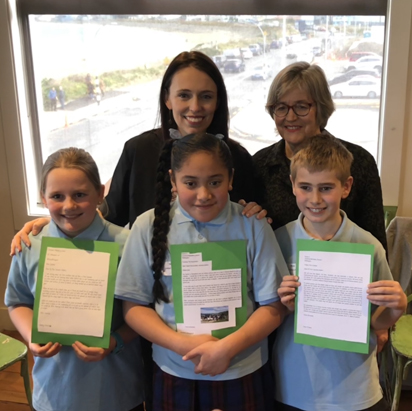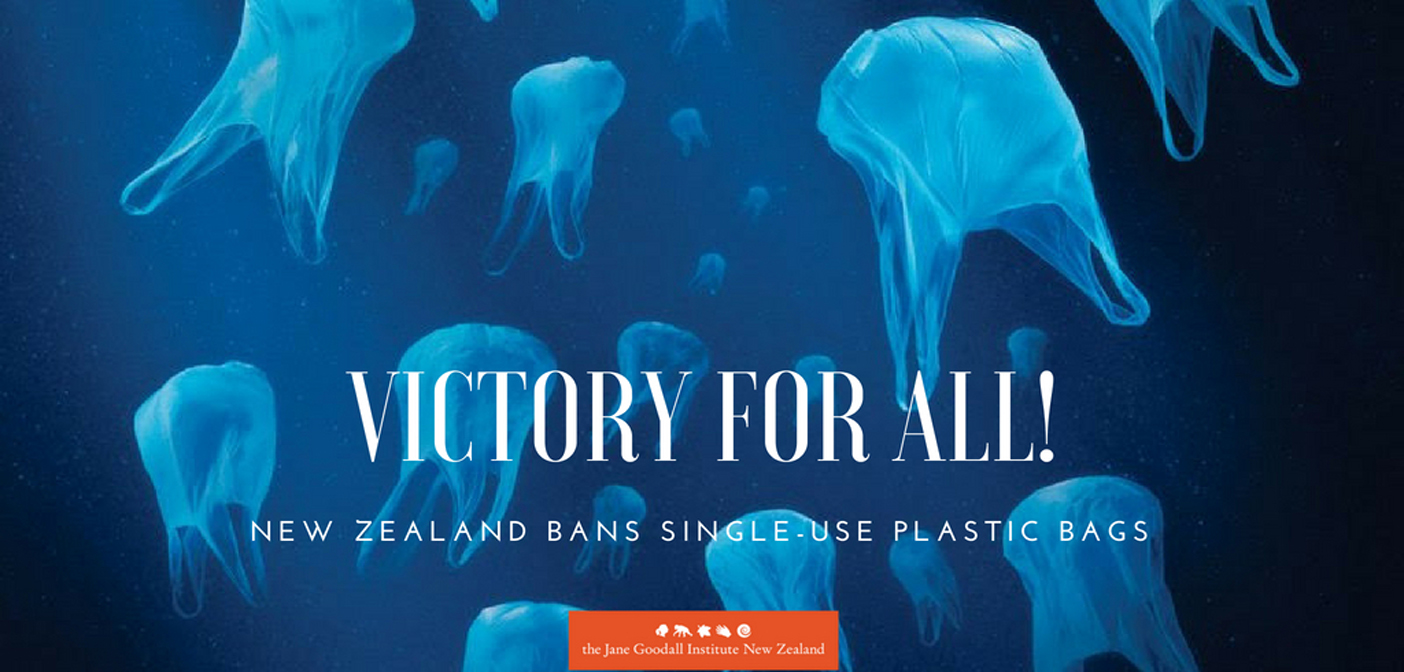WIN!! NEW ZEALAND BANS THE BAG
Good For All News - SERIOUSLY GOOD FOR ALL
AUGUST 10, 2018
The New Zealand government has pledged to rid the country of single-use plastic bags by July next year!
Earlier this year Jane Goodall Institute New Zealand and Greenpeace, gathered the support of organisations, retailers, and local governments, along with JGI Founder, Dr. Jane Goodall, JGIZ Patron and Former Prime Minister of New Zealand and Former UNDP Administrator, Helen Clark and 65,000 Kiwis, in calling for an outright ban of single-use plastic bags. Prime Minister Jacinda Ardern and Associate Environment Minister Eugenie Sage have said they were listening.
"Every year in New Zealand we use hundreds of millions of single-use plastic bags - a mountain of bags."
New Zealand is one of the highest producers of urban waste in the developed world, per capita, according to OECD data.
Ms Ardern said many plastic bags end up polluting the country's coastal and marine environments and cause serious harm to all kinds of marine life.
"And all of this when there are viable alternatives for consumers and business. It's great that many people are already changing the way they shop but it's important we take the time now to get this right."
She said before entering politics, and the prime minister role, she underestimated the impact of plastics on the environment.
"I also underestimated the strength of feeling amongst everyday New Zealanders around this issue. One of the groups of people that have helped me realise how much people care about plastics in the environment were children," she said.
"The biggest issue I get letters on from the public are about plastics and it comes from children. I literally get hundreds and hundreds."

The public can now share their voice during an open consultation period on all aspects of the change, including what alternatives should be and how best to help people with the transition.
Ms Sage said that New Zealand, as a nation, needed to turn the tide on plastic pollution.
"Given our reputation for adaptability, the strong public call for action I'm confident we can make this change together and we can be proud of it."
Ms Ardern said the announcement and consultation process were just the beginning of change.
"This first five-week consultation is one of the first steps towards the government's longer-term plans to be smarter in how we manage waste."
Ms Sage said many countries and major cities around the world have successfully taken action on plastic pollution in recent years, and she was confident New Zealanders could also embrace the change.
Scientists also estimate that eight million tonnes of plastic enter the world's oceans every year, and if nothing changed, there could be more plastic in our oceans (by weight) than fish by the year 2050.
The Jane Goodall Institute New Zealand is thrilled by the announcement of the ban of single-use plastic bags in New Zealand, and our part in this result – As JGINZ CEO and Co-Founder, Dr. Melanie Vivian says "This will have long term positive impacts for animals, people and our environment. - And highlights the positive difference people power can truely help bring about!"
For more on JGINZs 'Bye Bye Plastic Bags' #BanTheBagNZ campaign
For more on JGINZs 'Waste Not' campaign
What you need to know about the mandatory phase-out plans:
Which bags does this ban include?
- 'Single-use plastic shopping bag' refers to those with handles commonly found at retail checkouts.
- As part of the consultation process, the government is looking into the maximum level of thickness that should be allowed.
- Theconsultation document has more information on the different types of bags being considered.
Are biodegradable and compostable bags included in this consultation?
- The proposed mandatory phase-out includes "biodegradable", "oxo-degradable" and "compostable" bags - all types of degradable plastics.
- The government is recommending reusable bags over single-use alternatives for now because New Zealand does not yet have the nationwide infrastructure established to ensure that biodegradable and compostable plastics are processed in the right way.
- Biodegradable and compostable plastics can be as harmful to nature as their non-biodegradable counterparts if they do not enter an environment that they are designed to break down in. Oxo-degradable bags break down into microplastics, rather than nutrients and materials which nature can absorb.
How will I get my shopping home if I forget my bags?
- The government is proposing to give people a long lead in so that the public has time to adjust to reusable bags along with retailers who have yet to make the change.
- It also recommends customers take advantage of the offer by some supermarkets to use low-cost reusable bags or free used cardboard boxes. Or to bring their own wheeled trolley bags, backpacks or home-made bags.
- Retailers are also being told to consider alternatives to single-use plastic bags, including reusable bags in heavier-duty plastic, composite bags of hessian with other materials, and long-lasting bags made of lightweight nylon, cotton, recycled fabric or jute.
To take part in the single-use plastic bag phase-out consultation phase visit: http://www.mfe.govt.nz/plasticbags
